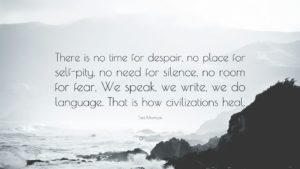The power of organized people.
July 10, 2018Richard Rohr
Center For Action & Contemplation
People have good reasons to be angry and afraid today. Poverty, racism, climate change, and so many other injustices are causing real suffering for much of the world. Unfortunately, dualistic and oppositional energies cannot bring the change we so desperately need; we cannot fight angry power with more angry power. Only the contemplative mind has the ability to hold the reality of what is and the possibility of what could be. Unless our hearts are transformed, our fears will continue to manipulate our politics, reinforcing a polarized and divided society.
Quaker activist and teacher Parker Palmer has a hopeful, but not Pollyannaish, view. He writes:
Human beings have a well-demonstrated capacity to hold the tension of differences in ways that lead to creative outcomes and advances. It is not an impossible dream to believe we can apply that capacity to politics. In fact, our capacity for creative tension-holding is what made the American experiment possible in the first place. . . . America’s founders—despite the bigotry that limited their conception of who “We the People” were—had the genius to establish [a] form of government in which differences, conflict, and tension were understood not as the enemies of a good social order but as the engines of a better social order.
As “We the People” retreat from the public square and resort to private gripe sessions with those who think like us, we create a vacuum at the center of America’s public life. Politics abhors a vacuum as much as nature does, so nondemocratic powers rush in to fill the void—especially the power called “big money.” . . .
When the Supreme Court gave big money even more power [in the 2010 Citizens United decision], it made many Americans feel even more strongly that their small voices do not count. . . . Wrongly held, our knowledge of the power wielded by big money can accelerate our retreat from politics, discouraging us from being the participants that democracy demands and reducing us to mere spectators of a political game being played exclusively by “them.”
Palmer quotes Bill Moyers: “The antidote, the only antidote, to the power of organized money in Washington is the power of organized people.”
Spiritualization
“I realized that the spiritualization of our nation’s corporations is the most important development that can possibly happen for the spiritual growth of the world as a whole. Governments apparently are unable to help. Churches have not fully succeeded; however, the multinational corporations that control the lives of countless millions have the power and financial wherewithal to bring on an incredible transformation of consciousness if–if it comes down from the top.”
Walter Starke, ‘It’s All God’.
Keep going.
From a friend.
Today seems like the right time to do a thread I’ve been thinking about for a while on how to handle the seemingly never-ending deluge of depressing and disturbing news. My tips are based on my time as a CIA military analyst in which I dealt daily with disturbing content.
1. TAKE ACTION. Volunteer for a food pantry, canvass for a political candidate, donate to a NGO, visit a sick friend. Seriously. Service of some kind in your community lets you be part of SOLUTIONS. You will see RESULTS when otherwise you’d feel helpless.2. Conversely, for those who may take tip #1 to the extreme–know that you alone can’t save the world. Accept your limits. You aren’t a 7/11. You can’t always be open. At the end of every day when I reached my limit, I silently told myself, “I’ve done what I can today.”(Note: Repeating that to myself did not stop me from feeling like I could have done more most days. But it was important to tell myself anyway because I am human. We are human. It’s good we *feel* things.)3. RESEARCH BEFORE PANICKING. Easier said than done, but everything will seem like crisis/earth-ending if you don’t know what has/hasn’t happened before. If it has happened before, it’s can be hugely comforting to know how it was resolved and/or what might happen next.4. GET UP & MOVE. Put the phone away, turn off the TV, log out of Twitter. Go for a walk, sit outside, get some coffee, call a friend. CIA is full of ppl walking the building with a colleague/friend. There’s a reason. Our brains & bodies need breaks from stressful content.5. SET RULES. Because of my work at CIA, I had a rule–I only read fiction at home. I had enough reality at work. In the civilian world, I set blocks of time each day where I turn everything off–no news or social media. Let yourself recharge so you can keep fighting later.
6. AVOID DARK HOLES. (I’m sure there’s a joke to be made about that.) It’s easy to get sucked into the swirl of bad news. You watch a gruesome YouTube video and the next one is all queued up to play right after it. Focus on one issue at a time. Deal w/ it before moving on.
7. YOU NEED FUN. When there is suffering, war, despair, etc. around you, it’s easy to feel guilty when you have fun, feel happy, have a good meal with friends. You NEED these things. You will be better able to do good in the world if you let yourself have these things.
8. TALK TO SOMEONE. Often, we curl inward socially when overwhelmed w/ negative content. It’s a means of protection. One of the great things at CIA was that everyone else knew what you were going through. Whether it’s therapy or talking to your person, talking helps.
Astounding.
It is astounding every summer people need to be reminded not to leave children in hot cars. Then I remember DT is president.
This story isn’t uncommon — around 37 children under the age of 14 die from being left in a hot car each year, with 13 already occurring in 2018, according to NoHeatStroke.org.


